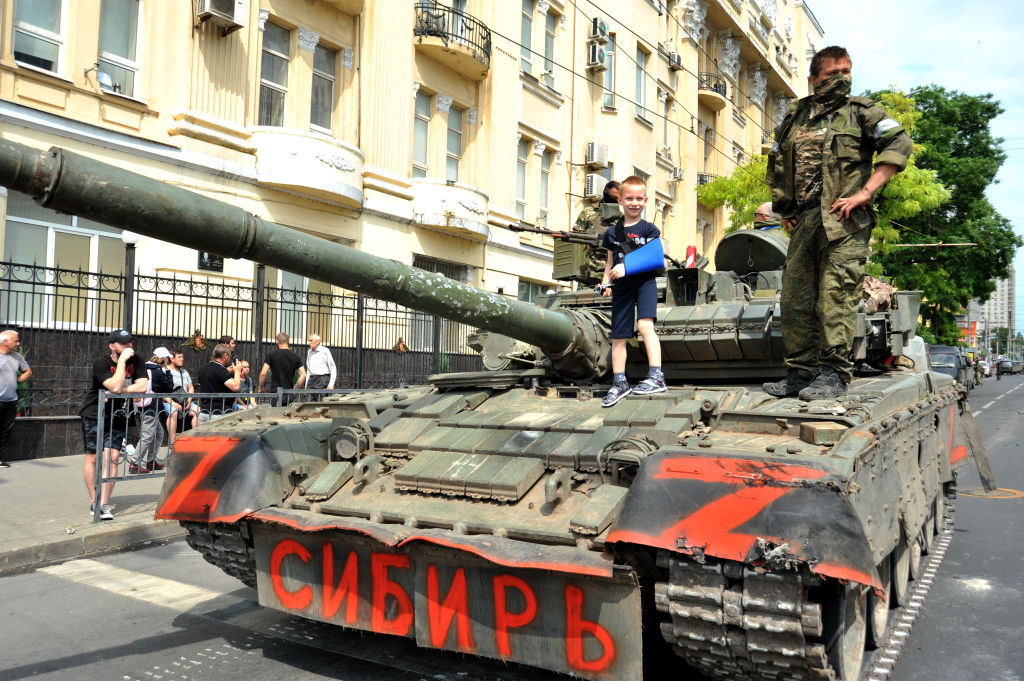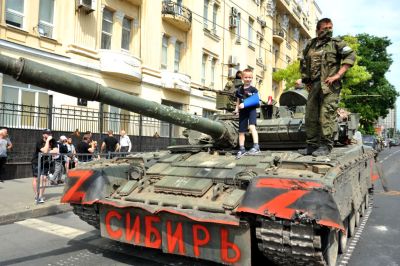Like many people, I was glued to the news for much of Saturday, watching what seemed, at least for a moment, to be the first stages of a coup d’état in Russia—and it still might be.
The only thing we know for certain is that if this is the beginning of the end of Vladimir Putin’s rule, that story won’t begin with the mutinous mercenary warlord Yevgeny Prigozhin leading an armored column of troops, guns a-blazing, into Moscow.
The funniest thing about much of the reporting and commentary of Prigozhin’s “March For Justice,” both in real-time and afterward, is how often observers described the spectacle as “unprecedented.” The Telegraph’s “Ukraine: The Latest” podcast—the best single source for daily coverage of the Ukraine war—described the “unprecedented coup against the Kremlin” at the top of a special Saturday episode, only for the panelists to start debating which coups from Russian history served as the best precedent for the unfolding events in Russia.
Even Putin, in his angry Saturday address, compared Prigozhin’s “stab in the back” to General Lavr Kornilov’s attempted coup in 1917 that paved the way for the Bolshevik Revolution and the Russian Civil War.
The point isn’t to nitpick—“unprecedented” isn’t a synonym for “shocking” or “momentous”—but to note that you can’t understand what’s unfolding in Russia unless you take into account that such events have lots of precedent. Indeed, since at least the 1700s, Russian history is really a story of coups of one sort or another.
In Western Europe, nobles drew their power and authority from their deep roots in their feudal territories. They answered to the throne, but they were largely sovereign over their own holdings. This diffusion of power and legitimacy created the space for the rise of liberalism and democracy in the West. The Magna Carta, for instance, was essentially a power-sharing agreement between King John and his nobles.
In Russia, under the pomestie system, nobles ruled various regions as emissaries of the czar, who literally owned all of Russia. Russian pomeshchiki were more like colonial governors, or warlord-contractors, with little connection to, or interest in, the serfs and peasants they exploited.
“All the things that connected the nobility of feudal Europe to a village or county – networks of charity and patronage, parish life, corporate bodies and local government, in short everything that fosters regional identities and loyalties – were thus missing in Russia,” writes Orlando Figes in his masterful The Story of Russia. “It was only from the middle of the nineteenth century that these local networks and identities began to evolve – too late, as it turned out, to sustain the development of an independent civil society or a democratic form of government.”
Thus, Figes observes, the “persistence of autocracy in Russia is explained less by the state’s strength than by the weakness of society.”
A parallel dynamic can be seen in the evolution of religion in Western Europe, where the authority of the church and the authority of monarchs were in constant tension. In Russia, no such tension existed because the czar was simultaneously the supreme religious authority and secular ruler to the point where the distinction between secular and religious did not exist.
Seen from this perspective, Soviet rule, particularly under Stalin, was more of a continuation of Russian history than a break with it. Putin sees himself in this light, which explains why he lionizes both czarist and communist history without any sense of contradiction.
This political tradition not only makes it very hard for Westerners to understand the Russian mind, it makes it hard to understand what the hell is going on there. We tend to see power as something granted from below, primarily through elections. Power is held accountable by the press but also competing spheres of power via divided government, checks and balances, and the rule of law. In Russia, power is unitary and seized from the top. Elections—if they occur at all—and the press are propaganda tools used to ratify the unitary power of the ruler.
Liberal democracies are designed to be adaptive, flexible, or resilient under stress. Russian autocracy is like marble, extremely strong, but also very brittle. That’s why cracks in the perception of power, often after military setbacks, can quickly lead to real collapses in power.
Putin and his apologists have assumed that time is on Russia’s side in the war with Ukraine. On paper, it can look that way militarily. But Ukraine and its Western backers have proven strong and supple while Putin’s Russia looks more brittle by the day. The Wagner incident is not likely to be the last crack we’ll see in Putin’s façade.







Please note that we at The Dispatch hold ourselves, our work, and our commenters to a higher standard than other places on the internet. We welcome comments that foster genuine debate or discussion—including comments critical of us or our work—but responses that include ad hominem attacks on fellow Dispatch members or are intended to stoke fear and anger may be moderated.
With your membership, you only have the ability to comment on The Morning Dispatch articles. Consider upgrading to join the conversation everywhere.